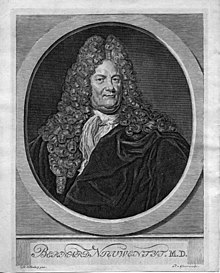Bernard Nieuwentyt

Bernard Nieuwentijt, Nieuwentijdt, or Nieuwentyt (10 August 1654, West-Graftdijk, North Holland – 30 May 1718, Purmerend) was a Dutch philosopher, mathematician, physician, magistrate, mayor (of Purmerend), and theologian.
Career
As a philosopher, Nieuwentyt was a follower of
Leibniz.[1]
Nieuwentijt advocated 'nilsquare' infinitesimals (which have higher powers of zero), whereas Leibniz was uncertain about explicitly adopting such a rule - they did however come to be used throughout physics from then on.
He wrote several books (in
French as De l'existence de Dieu démontrée par les merveilles de la nature, ou traité téléologique dirigé contre la doctrine de Spinoza par un médecin hollandais. Voltaire owned a copy of this book, and it was an influence on William Paley,[2] to the extent that in 1859 Robert Blakey could make "a detailed argument for plagiarism" by Paley.[3] To the English version was added a letter to the translator by John Theophilus Desaguliers.[4]
Nieuwentyt's posthumously published Gronden van zekerheid [Fundaments of Certitude, or the Right Method of Mathematicians in the Ideal as well as the Real] (1720) argued Spinoza's 'geometrical method' was not the proper 'experimental method' of science. The work also contains a critique of the ontological argument similar to a later critique by Kant.[1]
Works
- Het regt gebruik der werelt beschouwingen, ter overtuiginge van ongodisten en ongelovigen, Amsterdam, 1715
- The Religious Philosopher, 1718
- Gronden van zekerheid, 1720
See also
- Continuum (theory)
References
- ^ S2CID 121047594.
- ^ a b Jonathan Israel, Enlightenment Contested, p. 385–6
- ISBN 978-0-521-18303-1.
- ^ Bernard Nieuwentyt The Religious Philosopher: Or, The Right Use of Contemplating the Works of the Creator, Vol. II (transl. by John Chamberlayne) Cambridge: Cambr. Uni. Press, 2015
Further reading
- E. W. Beth, Nieuwentyt's significance for the philosophy of science, Synthese, Vol. 9 No. 1, 1955, pp. 447-453 (Published also as Chapter V in Science: a Road to Wisdom, D. Reidel Publishing Company, Dordrecht, Holland, 1972, Print ISBN 978-94-011-7646-0, DOI 10.1007/978-94-011-7644-6_5.)
- Steffen Ducheyne, Curing pansophia through eruditum nescire. Bernard Nieuwentijt’s (1654 – 1718) epistemology of modesty, HOPOS: The Journal of the International Society for the History of Philosophy of Science 7(2) (2017), pp. 272-301. https://www.journals.uchicago.edu/doi/abs/10.1086/693423
- Gysel C., Odontology, theology and antispinozism according to Bernard Nieuwentyt (1654-1718), Ned Tijdschr Tandheelkd, 1977 Jun; 84(6):214-6.
- Michael John Petry (1979). Nieuwentijt's Criticism of Spinoza, E. J. Brill.
- R. H. Vermij (1989). Een zekere, zakelijke wijsbegeerte. Tijdschrift Voor Filosofie 51 (3):544-544.
- JANTZEN, BENJAMIN C.. An Introduction to Design Arguments. CAMBRIDGE UNIVERSITY PRESS, 2014. ISBN 978-0-521-18303-1Paperback.
External links
- Bernard Nieuwentyt The Religious Philosopher: Or, The Right Use of Contemplating the Works of the Creator, Vol. II (transl. by John Chamberlayne) Cambridge: Cambr. Uni. Press, 2015
